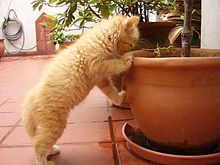- Curiosity killed the cat
-
This article is about the proverb. For other uses, see Curiosity killed the cat (disambiguation).
"Curiosity killed the cat" is a proverb used to warn of the dangers of unnecessary investigation or experimentation. A less frequently-seen rejoinder to "curiosity killed the cat" is "satisfaction brought it back".[1]
The original form of the proverb, now little used, was "Care killed the cat". In this instance, "care" was defined as "worry" or "sorrow."
Contents
Origin
The earliest printed reference to the original proverb is attributed to the British playwright Ben Jonson in his 1598 play, Every Man in His Humour, which was performed first by William Shakespeare.
...Helter skelter, hang sorrow, care will kill a cat, up-tails all, and a pox on the hangman.
Shakespeare used a similar quote in his circa 1599 play, Much Ado About Nothing:
“ What, courage man! what though care killed a cat, thou hast mettle enough in thee to kill care. ” The proverb remained the same until at least 1898. Ebenezer Cobham Brewer included this definition in his Dictionary of Phrase and Fable:
“ Care killed the Cat. It is said that "a cat has nine lives," yet care would wear them all out.
” Transformation
The origin of the modern variation is unknown. The earliest known printed reference to the actual phrase "Curiosity killed the cat" is in James Allan Mair's 1873 compendium A handbook of proverbs: English, Scottish, Irish, American, Shakesperean, and scriptural; and family mottoes, where it is listed as an Irish proverb on page 34.
In the 1902 edition of Proverbs: Maxims and Phrases, by John Hendricks Bechtel, the phrase "Curiosity killed the cat" is the lone entry under the topic "Curiosity" on page 100.
O. Henry's 1909 short story "Schools and Schools" includes a mention that suggests knowledge of the proverb had become widespread by that time:
“ Curiosity can do more things than kill a cat; and if emotions, well recognized as feminine, are inimical to feline life, then jealousy would soon leave the whole world catless. ” The actual phrase appeared as the headline to a story in The Washington Post on 4 March 1916 (page 6):
“ CURIOSITY KILLED THE CAT.
Four Departments of New York City Government Summoned to Rescue Feline.
From the New York World.
Curiosity, as you may recall—
On the fifth floor of the apartment house at 203 West 130th street lives Miss Mable Godfrey. When she came to the house about seven months ago she brought Blackie, a cat of several years' experience of life.
The cat seldom left the apartment. He was a hearth cat, not a fence cat, and did not dearly love to sing. In other respects he was normal and hence curious.
Last Tuesday afternoon when Miss Godfrey was out Blackie skipped into the grate fireplace in a rear room. He had done this many times before. But he had not climbed up the flue to the chimney. This he did Tuesday. Blackie there remained, perched on the top of the screen separating the apartment flue from the main chimney, crying for assistance. Miss Godfrey, returning, tried to induce her pet to come down. If you are experienced in felinity, you know that Blackie didn't come down.
On Wednesday the cat, curiosity unsatisfied, tried to climb higher—and fell to the first floor. His cries could still be heard by Miss Godfrey; who, to effect Blackie's rescue, communicated with the following departments:
1. Police department.
2. Fire department.
3. Health department.
4. Building department.
5. Washington Heights court.
Among them they lowered a rope to Blackie. But it availed neither the cat nor them anything.
Thursday morning, just before noon, a plumber opened the rear wall back of the chimney. Blackie was taken out. His fall had injured his back. Ten minutes later Blackie died.” Despite these earlier appearances, the proverb has been widely attributed to Eugene O'Neill, who included the variation, "Curiosity killed a cat!" in his play Diff'rent from 1920:
“ BENNY—(with a wink) Curiosity killed a cat! Ask me no questions and I'll tell you no lies. ” The author Stephen King has used an extended variation of this idiom in several of his novellas: "Curiosity killed the cat, satisfaction brought him back".
References
- ^ "Curiosity killed the cat". Gary Martin. http://www.phrases.org.uk/meanings/curiosity-killed-the-cat.html. Retrieved 2007-07-24.
External links
- "Curiosity Killed The Cat" at GoEnglish.com (with illustration)
- Henry, O. Schools and Schools. (Gutenberg text)
- Jonson, Ben. Every Man in His Humour. (Gutenberg text)
- O'Neill, Eugene. Diff'rent. (Gutenberg text)
- Shakespeare, William. Much Ado About Nothing. (Gutenberg text)
- Brewer, E. Cobham. Dictionary of Phrase and Fable.
- Mair, J.A. (ed.). A handbook of proverbs: English, Scottish, Irish, American, Shakesperean, and scriptural; and family mottoes.
Categories:- English proverbs
- English idioms
Wikimedia Foundation. 2010.

